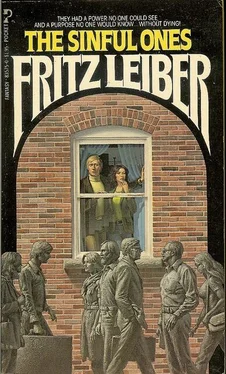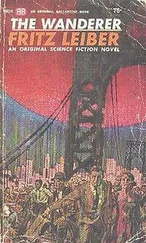“Have we?”
“Oh, yes.”
“Is that what you mean this afternoon when you wondered if I was ‘awakened’?”
“Maybe.”
The music stopped. Carr dug in his pocket for more nickels to put in the jukebox, but she shook her head. They slid back into their booth.
A telephone rang. The fat bartender carefully put down the tray of drinks he had mixed for the other couple, and went up front to answer it.
“Sure you don’t want to dance some more?” Carr asked.
“No, let’s just let things happen to us as they come.”
“A good idea,” Carr agreed, “provided you don’t push it too far. For instance, we did come here to get a drink.”
“Yes, we did,” Jane said. A rather impish expression came into her eyes. She glanced at the two drinks standing on the bar. “Those look good,” she said.
Carr nodded. “I wonder what you have to do to get them,” he remarked irritably.
“Walk up and take them?”
He looked at her. “Seriously?”
“Why not? We were here first. Serve them right.” Her eyes were still lively.
He grinned at her. “All right,” he said, getting up suddenly, “I will.”
She didn’t stop him, rather to his surprise. Much more so, there was no squawk when he boldly clutched the two glasses and returned with them to Jane.
She applauded soundlessly.
He bowed and set down the drinks with flourish. They sipped.
She smiled. “That’s another of my theories about life. You can get away with anything if you really want to. Other people can’t stop you, because of the rhythm. No matter what happens, they have to keep on dancing. They’re stuck. They can only interfere with you if interfering happens to fit the rhythm. Otherwise you’re safe.”
And rather true, thought Carr. Most people, himself included, went through life in fear and more or less controlled trembling, thinking that if they made the slightest move to assert themselves, they’d be jumped on. They fancied that everyone else was watching them, waiting for them to make a mistake. But actually the other people were as scared as you, or more so. And they rather liked you to make missteps and mistakes, because that eased their worried about themselves. There definitely was a sort of rhythm to life—or at least a counterpoint of opposed timidities. Take that bartender, who was busy with glasses and bottles again. He hadn’t even looked in their direction. He was probably embarrassed at having neglected to wait on them, and more relieved than annoyed at what Carr had done.
“Don’t you believe me even now?” she pressed. “You can get away with things. I’ll prove it to you again.”
A vague suspicion Carr had entertained when he’d first seen Jane, that she was some sort of shoplifter or petty criminal, flickered again in his mind, only to die immediately.
“You’re a funny girl,” he said. “What’s made you this way? Who’s—” He checked himself when she frowned. “Well, here’s a question maybe I can ask,” he went on. “What startled you so when you sat down at my desk this afternoon? You seemed to sense something in me that terrified you. What was it?”
She shrugged her shoulders. “I don’t know.” But again her eyes were sphinxlike. “Maybe,” she said, “it was just that I realize you were alive.”
“That’s queer,” he said gravely, “because you know, twice today I’ve had an—an illusion of—”
“Don’t,” she said, touching his hand. She looked at her glass for a moment, rubbed the beads of moisture, curved her hand around it wonderingly. “It’s good to be alive,” she said intensely. “Good. Of course the really marvelous thing would be to be back in the safe old pattern and still alive. But that’s impossible.”
“And the safe old pattern is…?” he prompted.
She shook her head and looked away. He dropped the question.
More people began to drift in. Carr and Jane finished their drinks, talking about the old advertisements and prints—how they had such a nostalgic feel because, unlike genuine artistic creations, they died with their decade, became dried funeral wreaths and faded love-letters. More people came in. Soon all the other booths were filled and there weren’t many empty spaces at the bar. Jane was becoming uneasy.
“Let’s go somewhere else,” she said abruptly, standing up.
Carr started to say something, but she had slipped around a couple approaching their booth and was striding to the door. A fear took hold of him that she would get away like this afternoon and he would never see her again. He jerked a dollar bill from his pocketbook and dropped it on the table. With nettling rudeness the newcomers shoved past him and sat down. But there was no time to be sarcastic. Jane was already mounting the stairs. Carr ran after her.
She was waiting outside. He took her arm.
“Do people get on your nerves?” he asked.
She did not answer. It was too dark to see her face. The pavement under their feet was uneven and slippery. He put his arm around her waist.
The alley came to an end. They emerged into a street where the air had that intoxicating glow it displays in the centers of big cities at nigh. As if the street laps puffed out clouds of luminous dust which rose three or four stories. Above that, dark walls going up toward a few dull stars.
They passed a music store. Jane’s walk slowed to an indecisive drift. Through the open door Carr glimpsed a mahogany expanse crossed by serried walks of ivory and ebony. There were uprights, spinets, baby grands. Jane walked in. The sound of their footsteps died as they stepped onto the thick carpet.
Whoever else was in the store was out of sight somewhere in the back, where a soft glow glamorized shelves of record albums and a row of cubicles. Jane sat down at one of the pianos. Her thin fingers moved for a while over the keys, nervously questing. The taut, talon-suggestive cords in the back of her hands underlined the expression in her face. Then her back stiffened, her head lifted, and there came the frantically rippling, opening arpeggios of the third movement of Beethoven’s Moonlight Sonata.
She didn’t play it any too well. She struck false notes and the general rendering was somewhat raucous. The impression was that of a student pianist who by a passionate determination has succeeded in grappling passably with a piece beyond her real technical proficiency.
For she did manage to extract from it a feeling of wild, desperate wonder.
Carr stopped speculating as to why a clerk didn’t emerge and at least give them a sizing-up glance.
Surely if the composer had ever meant this to be moonlight, it was moonlight illuminating a white-pinnacled ocean storm, through rifts in ragged clouds.
Jane’s lips were tightly bitten together. Her eyes seemed to be frantically searching out the next notes in an invisible score. Her body shook as her arms pounds from the shoulders.
Suddenly it was over. In the echoing quiet Carr asked casually, “Is that more like it? The rhythm of life, I mean?”
She made a little grimace as she got up.
“Still too nice,” she said. “But there’s a hint.”
They started out, Carr looking back over his shoulder.
“Do you realize we haven’t exchanged a word with anyone tonight?” he said.
She smiled wryly. “I think of pretty dull things to do, don’t I?” she said, and when he started to protest, “Yes, I’m afraid you would have had a lot more fun with Marcia…or with Midge’s girl-friend.”
“Say, you do have a memory,” he said in surprise. “I wouldn’t have dreamed you’d—”
He stopped. She had ducked her head. He couldn’t make out whether she was crying or laughing.
“…Midge’s girl-friend…” he heard her repeat chokingly.
Читать дальше









